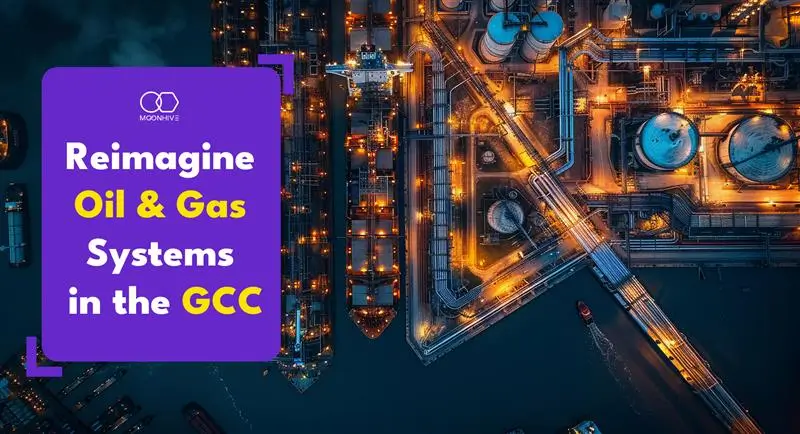The oil & gas sector in the GCC (Gulf Cooperation Council) is undergoing rapid transformation, and legacy modernization GCC initiatives are now critical for survival. Many enterprises in Saudi Arabia, UAE, Qatar, and Kuwait still rely on outdated IT systems that hinder compliance, scalability, and innovation. To remain competitive, GCC oil & gas companies must modernize their legacy infrastructure with secure, scalable, and regulation-ready solutions.
In today’s rapidly digitizing world, GCC enterprises are realizing that legacy modernization is not optional it’s mission-critical. The ability to integrate advanced analytics, IoT, and AI depends on modern systems that can scale securely and comply with regional data laws.
The Challenges of Legacy Systems in GCC Oil & Gas
Oil & gas firms face unique challenges that legacy systems struggle to address:
- Compliance Burden
New regulations across Saudi Arabia and the UAE, including cybersecurity and data residency laws, demand stronger systems than outdated ERPs can handle. - Operational Inefficiencies
Old SCADA systems, siloed data, and manual reporting processes slow down operations and increase downtime. - Limited Scalability
Legacy systems cannot integrate emerging technologies like predictive maintenance tools, IoT sensors, and AI-driven analytics, putting firms at a disadvantage. - Rising Maintenance Costs
Supporting outdated software consumes significant IT budgets, leaving less room for innovation and strategic investments.
Key Strategies for Legacy Modernization in GCC
To overcome these challenges, GCC oil & gas firms can adopt a phased and strategic modernization roadmap. Below are proven strategies:
1. Replatforming to the Cloud
Shifting legacy applications to the cloud is one of the most effective modernization steps. Cloud platforms (AWS, Azure, or local GCC providers) ensure scalability, data security, and resilience.
Benefits of Cloud Migration:
- Enhanced data availability across global and local sites
- Compliance with data residency requirements in GCC
- Reduced infrastructure maintenance costs
- Faster deployment of new digital tools
2. Encapsulation via APIs
Encapsulation enables enterprises to extend the life of legacy systems by exposing their functions through APIs (Application Programming Interfaces). Instead of a full rebuild, firms can integrate modern applications with legacy databases.
Advantages of API-Driven Modernization:
- Faster integration with ERP and CRM solutions
- Lower upfront investment compared to complete replacement
- Gradual modernization while maintaining operations
3. Transition to Microservices
Many GCC oil & gas systems are monolithic, meaning a small change in one module risks downtime for the entire system. Moving to microservices architecture ensures agility, allowing companies to scale and innovate quickly.
Why Microservices Work for Oil & Gas:
- Independent scalability for exploration, drilling, logistics, and finance modules
- Reduced risk of downtime during updates
- Faster deployment of new features
4. Security-First Re-Engineering
Modernization is not just about speed it’s also about security. Re-engineering legacy applications with robust cybersecurity protocols ensures compliance with GCC mandates and global standards.
Best Security Practices:
- Implement role-based access control (RBAC)
- Use modern encryption protocols (TLS 1.3, AES-256)
- Deploy real-time monitoring and automated incident response
- Ensure compliance with ISO 27001, NESA (UAE), and SDAIA (Saudi Arabia)
5. Hybrid Modernization Roadmap
For large enterprises, modernization cannot happen overnight. A hybrid roadmap combines multiple strategies: rehosting some apps, refactoring critical ones, and rebuilding outdated systems.
Hybrid Approach Benefits:
- Reduces business disruption
- Balances modernization cost with ROI
- Enables phased implementation aligned with strategic goals
ROI of Legacy Modernization for GCC Oil & Gas
Enterprises that invest in modernization gain tangible benefits:
- Cost Savings: Up to 40% reduction in IT maintenance
- Efficiency: Faster workflows and reduced downtime
- Innovation: Ability to deploy AI-driven predictive maintenance and IoT-enabled field operations
- Compliance: Alignment with evolving GCC data laws and security frameworks
Best Practices for GCC Enterprises
To ensure successful modernization, oil & gas firms should follow these best practices:
- Conduct a comprehensive legacy system audit before deciding on rehosting, refactoring, or rebuilding.
- Align IT strategy with Saudi Vision 2030 and UAE Digital Government Strategy 2025.
- Partner with vendors experienced in regional compliance and large-scale enterprise solutions.
- Plan for ongoing local support to ensure system resilience and adoption.
Future-Proofing Oil & Gas Enterprises
Legacy system modernization in the GCC is not just a technology initiative it is a strategic enabler of growth, compliance, and operational excellence. For oil & gas firms, embracing modernization through cloud migration, API encapsulation, microservices, and security-first design is key to staying competitive in a global market.
At Moonhive, we help enterprises modernize legacy infrastructure with solutions tailored to GCC compliance, security, and scalability requirements.
